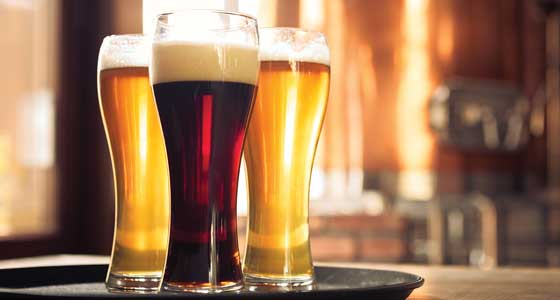Brewing a Better Beer
IFTNEXT

Over thousands of years, many cultures and master artisans have perfected the art of brewing beer. Today, science is exploring ways to brew a better beer through the elimination of hops, the use of acid whey, and the addition of probiotics.
Eliminating Hops
Four main ingredients are needed to make beer—grains, yeast, hops, and water. But scientists at the University of California–Berkeley are attempting to produce beer without the use of hops while still maintaining beer’s characteristic “hoppy” flavor.
Because irrigation of hops in the United States alone requires more than 260 million gallons of water a year—not to mention fertilizer and energy to transport the crop—researchers are interested in finding a more sustainable alternative.
In a study published in Nature Communications, the UC Berkeley scientists reported that brewer’s yeast can be engineered to biosynthesize aromatic monoterpene molecules that impart hoppy flavor to beer by incorporating recombinant DNA derived from yeast, mint, and basil.
“The real challenge of the study was to produce strains that produce flavor molecules at the right concentrations without sacrificing other aspects of the brewing yeast performance,” says study author Charles Denby, a biochemist at UC Berkeley. The researchers worked with Lagunitas Brewing Co. to organize a double-blind taste test with 40 participants. Interestingly, the sensory panelists characterized beer made from the engineered strains as more hoppy than a control beer made with regular yeast and Cascade hops.
Denby and fellow study author Rachel Li have launched a start-up called Berkeley Brewing Science to develop and market hoppy yeasts that mimic a variety of hops to brewers, with the goal of enabling a more cost effective and sustainable solution for the brewing industry. “We’re just scratching the surface in terms of what yeast can do,” says Denby.
Beer From Dairy Waste
Beer and other alcoholic beverages crafted from whey may be a reality in the not-too-distant future if Sam Alcaine, assistant professor in the Dept. of Food Science at Cornell University, is successful in his quest to find inventive uses for dairy by-products.
Alcaine noted that the large amount of acid whey resulting from the production of Greek yogurt and strained yogurt did not have many value-added options for utilization. “I’m an ex-brewer,” he says, “and thought there was an opportunity here to utilize the lactose and acid whey to create something similar to a sour beer.”
Alcaine and his team are experimenting with different yeast species, some traditional some not, that utilize lactose and produce ethanol, as well as several different filtration technologies for pre- and post-fermentation modification.
The results, thus far, are encouraging. “We’ve characterized the fermentation and have a product that is about 3% ABV [alcohol by volume], high in minerals like calcium, and flavored with fruit juice/herbs. The prototype has also gone through some consumer testing with great positive feedback and interest.”
Probiotic Beer
Probiotics are trendy, and consumers can find them in all types of food products from breakfast bars to juices. In the future, a novel probiotic beer may join these probiotic-enriched products. Researchers at the National University of Singapore have developed a sour beer that includes probiotics.
The researchers took about nine months to formulate a beer with the optimal count of live probiotics (a minimum of 1 billion probiotics/serving, according to the International Scientific Association for Probiotics and Prebiotics) to attain maximum health benefits. They propagated the probiotic and yeast in pure culture and modified conventional brewing and fermentation processes. The probiotic strain Lactobacillus paracasei L26 uses the sugars present in the wort to produce sour-tasting lactic acid that gives the beer tart flavors. The beer takes about a month to brew and has an alcohol content of about 3.5%. It has a shelf life of three weeks under refrigeration.
The beer is currently under patent consideration, and a company called Probicient has been formed to commercialize the probiotic beer. The next steps are to find ways to extend the beer’s shelf life and refine the product.
IFTNEXT content is made possible through the generous support of Ingredion, the IFTNEXT Platinum Content Sponsor.
